Meeting the Swedish makers of a Ugandan-inspired film
I meet the directors who were inspired to make a film by a Ugandan cycling advocate, Amanda Ngabirano.
"Amanda is a force in itself worth capturing and we were all blown away by her energy, her passion, and how she wanted to include everyone in society."
Cycologic is a short film that brings to life the efforts of Ugandan urban planning lecturer Amanda Ngabirano to transform Uganda into a more bicycle-friendly environment. New Vision's Joseph Kizza caught up with two of the three film directors in Kampala for a thought-provoking indepth interview about their lives, their aspirations and most importantly, their film.
Film title: Cycologic
Directors: Elsa Löwdin, Veronica Pålsson & Emilia Stålhammar
First screening in Uganda: At Bayimba International Festival (September 18, 2016)
INTERVIEW
To begin with, who is Elsa? Who is Veronica?
Elsa: Well, I am from Stockholm, Sweden. I am a person who has always been interested in discovering different cultures, which led to my traveling a lot since I graduated from High School. I have been living in Berlin [Germany] for two years because I had always wanted to try out what it is like to live in another country and I love the culture I found in Berlin. I grew up in quite a cultural home, I guess - with art and culture being constantly present, which I guess affected me a lot. I felt very creative but it was hard finding my niche. Actually I've always known that I wanted to work with film. Film has been my biggest passion - since I was 10. But I never really dared to try it out until I started this school - The Swedish Red Cross University College - one year ago. And that combined everything that I am interested in. I mean, documentary film combines discovering society and meeting new people and trying to capture a story using a camera. Every year, the school comes to Uganda for students to make their film projects.
Veronica: Well, I am quite a simple person [laughs]. We are actually similar, me and Elsa. I am not from Stockholm; I grew up in a small city in the north of Sweden called Umeå. I've always been very creative, I've always been doing art, music, dancing, photography. Like, I have always wanted to express myself creatively - I always needed it. And somehow, I've been hoping that I would find my way to actually work with it to make a living - being creative, that is. I've always been independent, and I've traveled a lot - just like Elsa. We are not different [laughs]. That's why we are a good team. I've always been interested in languages and cultures from different parts of the world - all parts of the world. And also adventure and new experiences, so I love traveling, mostly by myself to really get connected to a new place and learn about it.
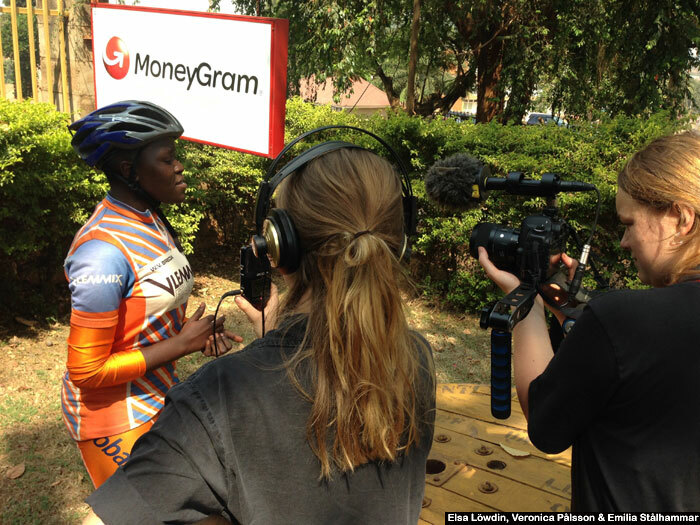
How long have you been in the filmmaking industry? Is your niche documentaries/short films or have you also ventured into feature filmmaking?
Elsa: Well, like I said, I knew since I was 10 I wanted to work with film and since I was 17 I knew I wanted to do documentary films. But I haven't actually done anything with it; tried it out only one year ago when I was at school. So we are quite fresh when it comes to filmmaking.
Veronica: Yeah, we're new in the business.
Elsa: We are super fresh. We've just made one short film.
So, according to you, why is a documentary important? What impact does it have on an audience, or generally speaking, the society? Why should documentaries be made?
Elsa: I think it is important. I think in general it is important to listen to each other and create understanding for each other, because how are we going to get along on this planet if we don't understand each other and understand our differences and our similarities? So I really think it is important that we communicate and you can do that in many different forms and one of those is documentaries, where it's very direct - you see it and you hear it and you feel it. Like, it's a very direct form of media.
Veronica: We try to make documentaries that we connect to. That are not only just informative but also more emotional. I think that's super important. One of the most important things I could do is to help people connect and understand each other.
Elsa: And I think it's powerful how much you can access someone's understanding by film. Personally why I like documentary is how available or accessible it is: you just need a camera and a microphone and the story. Instead of doing, for example, a fiction movie which commands so much work, and so many people need to be involved. I also like how wide the documentary genre is. It's just up to me, especially considering that I love to experiment.
I believe that sometimes, filmmakers try to reveal certain aspects of themselves or personal experiences through their work. Is it the same with you? Would you say that of ‘Cycologic'?
Veronica: I don't feel that I need to reflect my thoughts and feelings on others. For me it's more important to be like the portal between something, to help two different groups to communicate. I'm just the media, I'm just like the one capturing this process and sharing it. I don't really feel like I am out there to change the world by preaching what I believe in. I just want to be that portal.
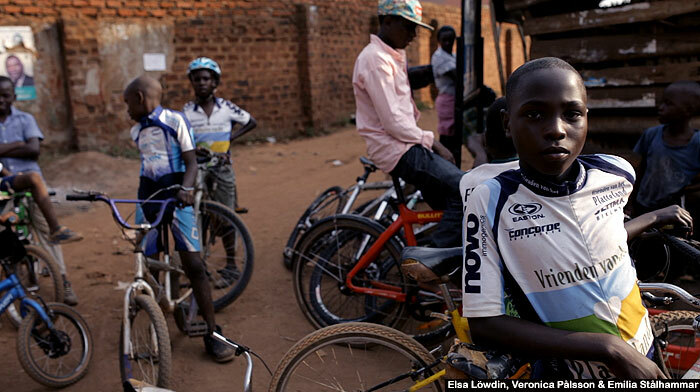
Speaking of Cycologic, why Amanda? Why Africa? Why Uganda? Why, of all things, bicycles? And, why that film title? In a previous interview, you said you stumbled across an article by Amanda. How did that inspire you?
Veronica: Well, we knew we were coming to Uganda. We knew that even when we started our program - we would spend two months in Uganda, any city, and we would make a documentary. That's what we knew. So we were bundled together: me, Elsa and Emilia as a team. So we started like thinking ‘what kind of movie do we want to make?' And we quickly agreed that we wanted to make a film that (…) is inspiring and that's not about an issue, not about a problem, not about diseases or starvation. We simply wanted something inspiring. That was our starting point.
Elsa: I mean, in general we think, we often miss in media circumstances a wider perspective or documentation of many countries from Africa. Yet it's pretty much the same things we face too - like starvation, poverty, etc. Of course, those things exist too . . .
Veronica: . . . it's very important for them to be covered too but we just felt that there's a shortage of the positive stories.
Elsa: There's so much more than that [the negative aspects often reported about Africa] and most of the time we don't see that in Sweden or other European countries in general. So we wanted to capture the positive in our documentary.
Veronica: Also, the second thing we agreed on is, we found that generally women are under-represented in the media and in story-telling. So we were really determined that we wanted a female character. We wanted to be connected to a female perspective. Not just because the character is a woman but because she is a member of the society, like anyone else. Well yeah, that's how we started. We had a lot of ideas.
Elsa: On why we chose to focus on cycling, we talked to many people to try and get a general idea, and we heard something about bicycles being made out of bamboo and immediately thought ‘Oh, this could be something!'. So when we Googled about bicycles, we came across an article by Amanda and thought there's something special about this lady. So I guess it started off more like an interest about who Amanda is and what she wants to do in her society and what she is doing. So when we arrived in Uganda we had already a few ideas on what we could do but we just hadn't settled for any. In fact, we had an appointment with Amanda and as soon as we met her, we knew - even without talking to each other - while talking to her in her office what we were going to do. First of all, Amanda is a force in itself worth capturing and we were all blown away by her energy, her passion, and how she wanted to include everyone in society and how she thinks of every kind of aspect, how she lives as she learns, which in my opinion every true leader should do. One of the things that she said that intrigued us was that females here don't ride bicycles because they want to look nice and they want to carry their handbag, wear their high-heel shoes and dresses, and that's why they think that they can't ride a bicycle because it can't provide for that. But Amanda says ‘Oh yeah you can!' She brings her high-heels and handbag and skirt to the bicycle to show that you can. It works!
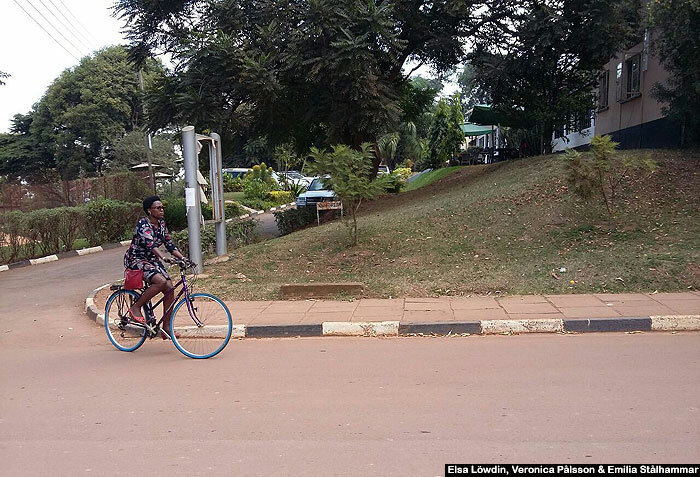
Veronica: Amanda (pictured above riding within Makerere University, where she is a lecturer) a living example of everything she's trying to advocate for. She is so true to her goal. Society needs people like her.
Elsa: Hundreds of people like her. But they are quite rare.
Veronica: She's very unique, in a way.
Elsa: And in every kind of society, there's positive change being created thanks to such people as Amanda who work with passion for the betterment of their societies. And those are the people in the end that are most important for a society. Well, I mean, that's what history taught us.
How did the physical environment here affect your drive to go ahead with your project?
Elsa: The first two weeks, I was the more skeptical. I would be like ‘I don't want to cross this street, I can't do this!' But as soon as we understood the system, we were like it's just a fine society. We also observed that people [controlling] traffic have so much respect for each other and understand each other. So as soon as we got back we were fine. But of course, we were filming in the most intense environment. We were standing in the middle of the roads in this heavy traffic while filming.
Veronica: We were sitting on a boda [facing] backwards, with one in the middle holding the one holding the camera. So yeah it was intense and I think we thought many times like ‘what are we doing?' [laughs]. But the story kept us going. There's something about Amanda - her character, her power, is an inspiration. And also something that attracted me to the question of bicycles was that it's something simple, very original. It's a very small question in society but through this interest she had, she managed to connect bicycles and cycling to so many things. At first we were just interested in her and her story then we realized that there're all these things. So it just became bigger and bigger and we learnt more things.
Elsa: It combines health, feminism, social justice, lifestyle, environment . . .
Veronica: . . . and also an identity for East Africa, like people's struggles. That's also connected to why we chose the name ‘Cycologic', because people don't believe it [having cycling lanes]. They don't see it, they don't believe it's ever going to happen: bicycle lanes. ‘It's not for us, maybe it works in the Western countries', they think. ‘Maybe in Europe, fine, but not here'. And that has been one of Amanda's biggest struggles, to make people believe. We can have it [bicycle lanes] and it can be great and make our urban environment so much better. But people are like ‘we don't see it'. So it's all about the mindset and the mistrust to change. We did a lot of field work, we talked to people on the streets and also a lot of interviews to get opinions and everyone agrees that the traffic is terrible. Everyone agrees that it's a huge problem but they don't see a diversity of solutions. Most of them talked about flyovers, bigger roads, changing the whole city and when we talked about maybe changing what already exists, they didn't see the picture. They didn't believe in it.
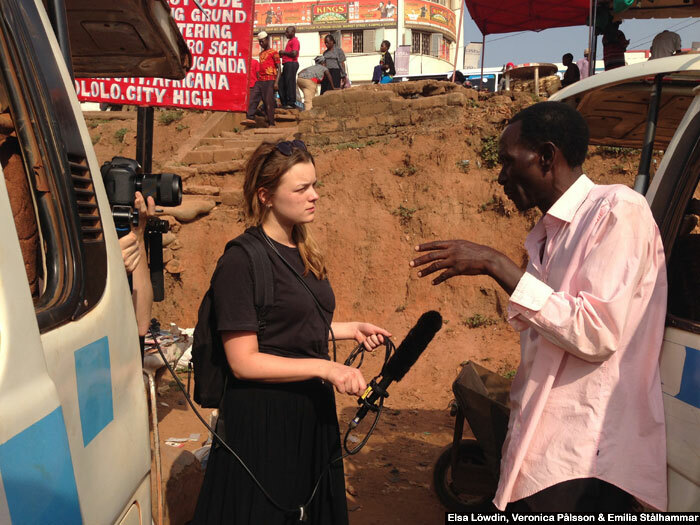
So what does it take to change such attitudes? It's one thing producing a potentially award-winning documentary that touches on a very critical issue (s) in a given society, and it's another providing a solution to the said subject. Have you addressed this important hurdle with your film Cycologic? Are you offering ways of how the problem can be solved?
Elsa: For changing the mindset, I think it's by showing an example. They need to see that it works before they can believe in it, because they haven't seen it. So it's difficult to imagine something that you haven't seen or been a part of. But for the film, we think of it as one tool to use in this question. We can use the film as a start-up for like giving people the idea of what it could be about. Amanda and the film could work together to get out the message of the documentary and hopefully effect it . . .
Veronica: . . . yeah, because the film definitely doesn't have all the answers. It's more to create interest and awareness and stir some new thoughts. And when people see it, it can perhaps plant some seeds of change inside their minds.
With the inevitable question of funding, how did you manage to bring your docu-film to the screen? First, of course at the Malmo Festival in Sweden, then here in Uganda at the Bayimba Festival.
Veronica: Aside from our hard work, we had the support from the school. They helped us with the equipment, and such things like the trip over here was on us.
Elsa: We are very lucky to have the project in Sweden, because when you study you can get a loan from the government, so you don't have to work while studying and using your own money. So we could do the project because of the loans we can take from studying. But still, we have to give it back [pay back the loan].
Veronica: It's a low-budget project. Instead we spent a lot of time. When we came back, we spent two months doing research and recording and when we went back to Sweden, we started editing. The first weeks were a process of doing research. We were driven by ambition and passion.
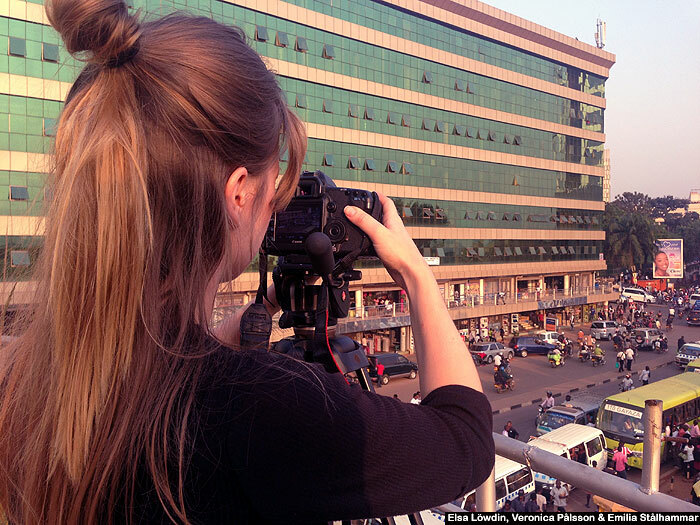
And what about funding for, I believe, future film projects?
Veronica: Well, we know it's a struggle, the film business. It's a big deal and so in reality it's hard to get funding. We will probably look to sponsors, foundations, companies, etc.
Elsa: Ever since we started, we've had people in the business telling us how hard it is, and you can only do it if you really, really love it. Otherwise you will not succeed. Although I find the constant comments that the film industry is a hard place to be very uninspiring. It's a slap in the face. But we are determined and we are up for the challenge.
Veronica: Well, for Cycologic, the biggest part of our research was talking to people connected to traffic or cycling or somehow transport. So yeah we had a lot of interviews that's not in the movie. It was for our full understanding of the dilemma. We also had a long interview with a man, presumably in his 70s, - Moses - who has been riding a bicycle since he was young. It turned out to be a great informative interview for us and the subject. Most of the people we talked to were sweet and intrigued by our kind of interest. They were surprised. When we would tell them what we were doing, they would be like [gestures with a look of awe].
In the African context and mostly in the urban areas, it's rare to find a female riding a bicycle, especially an adult. That mode of transport is widely seen as for males. Do you see the bicycle as a tool that can break such stereotypes? Can a bicycle be an agent of social change?
Veronica: Well, it's a part of this movement of changing existing stereotypes, changing the mindset, pushing the discussion in this context. So I think it could be part of it. That's what we wanted. That was our goal - to have this inspiring woman [Amanda] doing something against the norms. It crashes the stereotypes and that's what she is doing. She is doing it every day, all the time, everywhere. And we just decided to capture this because we found this to be something valuable for more people to see. So we wish the bicycle to be part of this change. That's our ambition. It would be wonderful if it did.
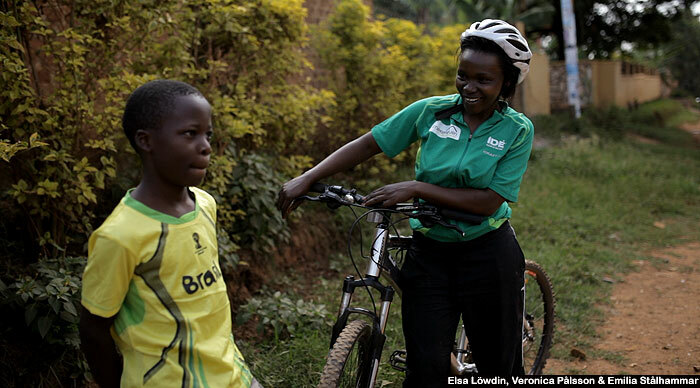
We live in a generation where women are becoming emancipated. Do you feel there's any link between a woman, a bicycle and development?
Veronica: I definitely think there is a connection. And I think when you talk about independence, I think that's the key word to what something as simple as a bicycle could do for women in a society. Like the situation is now, women are being emancipated more and more. They are becoming more liberated but still in many households, when there's a car, the car belongs to the man and not the woman. Yet in most cases it is the woman who does the errands - drops and picks the kids from school, shopping, everything. And in many cases she doesn't have her own vehicle to get from point A to B. And so that's one of the gaps for which the bicycle could be the starting point for compensating this gulf for the women in order to create a better sense of independence for them. It should also create confidence among women in a way that they don't have to be dependent on a man all the time. The bicycle is so simple but it can be key in filling that gap.
Elsa: And also just how society looks at women, that women have to be protected and a girl should just be a girl and not be allowed to get dirty and adventurous, and if we are stuck in those ideas of how a woman should behave, we will never develop and crash the existing norms. You have to start somewhere and a female on a bicycle could improve many of those things that in many countries are thought of as stuff a woman should not do - like be on her own, have her own way of movement, etc. So if we have more women on the bike, then the quicker we can do away with the social imbalances in society.
Veronica: It's about women doing something by choice and not because there is no other option. Like Amanda (pictured below), she could be driving her car, but she chooses to ride her bicycle because she wants to.
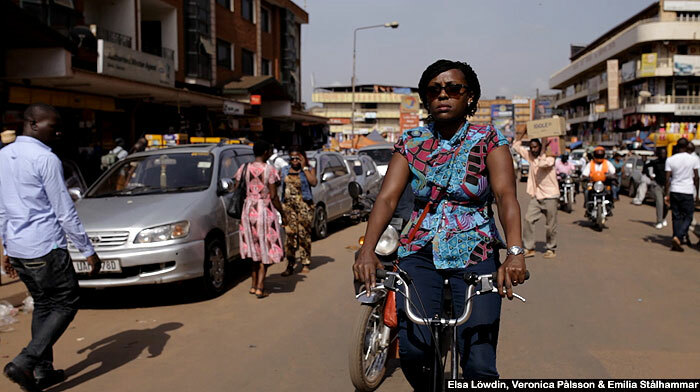
So how did it go at the Malmo Festival (Sweden) on its first release?
Elsa: Malmo was great, actually. There was a big turnout, more than we had expected. Afterwards, we talked about it, our own thoughts, about making the film. There was also a Q&A [question and answer session], and there were a lot of questions. People were very much interested! To me, it's a big deal showing Cycologic here in Kampala, and in fact it's the most nervous part of doing it. You see, we came here and tried to capture a city we knew very little about and so we didn't really know what the locals would think about it. And that's the scariest part. We don't want to inadvertently insult anyone. Generally, it's hard to say what people are going to say about it here. Hopefully, we can contribute to the change of people's mindsets here. We want to get the movie out there in many different ways - on TV, etc.
(I show them this picture below, brief them what it was all about . . .)
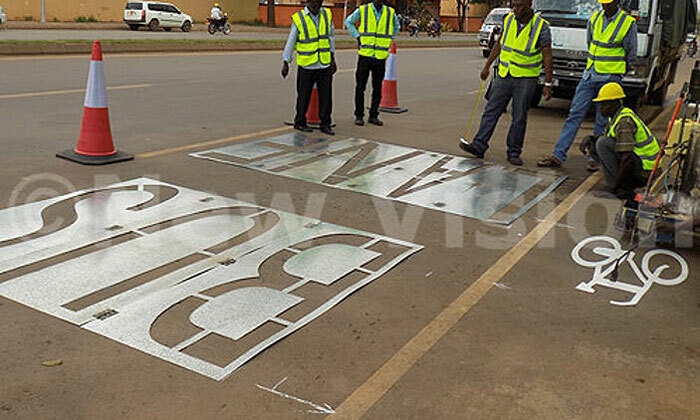
Mid last year, KCCA started marking off bicycle and bus lanes, but the project didn't go far. In the wake of your film, what's your message to local authorities and the public at large?
Elsa: When I see this picture, it makes me think that it's important to work with what you have, and what you have now is such a mess. So a lane like that painted on the road won't make a difference. You have to start with, uhm, ‘how do we organize this in a sustainable way?' And Amanda's idea of the project is one way, because you make something new you haven't tried before. There is a vision that this could work, and we don't know if doesn't until we try it out.
Veronica: Like for real, by the way. Not just something like painting a line on the road. You just can't paint a bicycle lane; you have to think about the cars, the bodas. You have to like put all the pieces together for it to work. It's all here [points to the head, denoting mindset] and it's a mess. They need to find proper structures for all these groups [of road users].
Elsa: Another message to the authorities is to learn from the mistakes that Europe has done. Because we have the impression that in general there is a wish to try to create the same kind of environment that exists in the Western world - which is very understandable - but the situation in general when it comes to environment that we have in Europe doesn't work. So learn from the mistakes that we made in Europe of building too many highways and flyovers and bringing too many cars. To learn from that, you need to think in a new way. Uganda is unique, so you don't have to become like a country that already exists. Do what is suitable for Uganda.
Veronica: Like we've said, it's hard to reach authorities. It's hard to reach the politicians to change whatever you are striving to do because it's so integrated, it's so complicated . And everyone is thinking about themselves. But one way to do it is to start at the grassroots level. Go in the people's minds, especially the ones being affected by this, the ones living in the society. Start planting the idea in their heads and eventually, maybe it becomes a movement and then a general opinion. Maybe some people will start to ask for more and eventually the politicians have to help them.
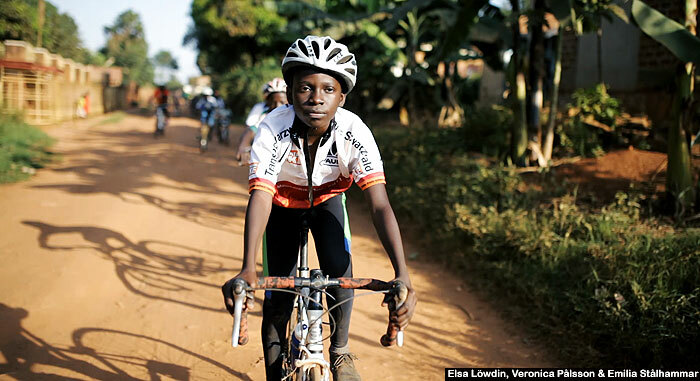
And at a time when climate change is a staple of global discussion, what are your thoughts on the role of man in, say, global warming, which is caused by for example emissions from vehicles etc? Is this the time the world should embrace more cycling? Also, with a large part of the global population becoming obese, could the bike be one of solutions?
Veronica: Oh yes, sure. Well, like Amanda keeps saying, people are already riding the bicycles. The cyclists are here and they need to be provided for. So just start with them - think about the environment, think about health and safety, think about the traffic, think about the society, think about the stereotypes. It's all connected. It's as simple as that. Cyclists are in danger all the time on the road, as are pedestrians.
Elsa: No one should be forced to jump on a bike. But provide for those who are already doing it. That's all I am asking for. And that's what Amanda is advocating for: everyone should be included - regardless of sex, age, status, economic level.
Where can one access the film?
Veronica: Well, for now we have done the screening first here in Kampala. Interestingly, it's been shown all over Europe. It's been really appreciated in Europe and our goal now is to spread it here [in Uganda] and that's why it was very important for us to come back here and it be organically part of it. And for the public, feel free to reach to us. You could probably feel that ‘well yeah, it should be shown here', so feel free to let us know. We want to show this film, we want everyone to see it. But it's not yet online. We have a Facebook page: CYCOLOGIC, where we post the different screenings of the film and related information.
And, feel free to reach out to us via email in case of anything related to the film:
elsalowdin@gmail.com
veronica.palsson@gmail.com
FACEBOOK: @cycologicdocumentary
ALSO RELATED TO THIS ARTICLE
Amanda Ngabirano: the Ugandan who inspired Swedish filmmakers